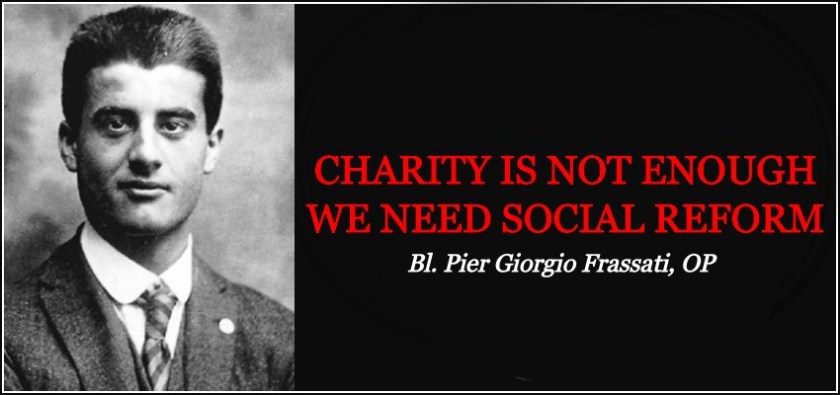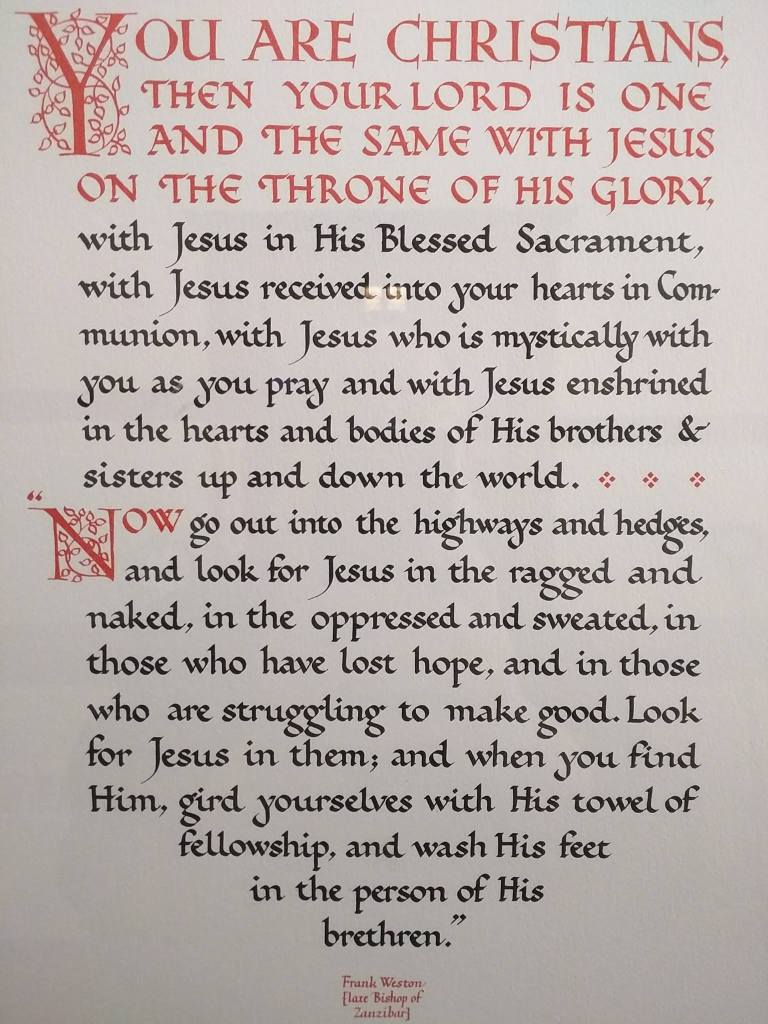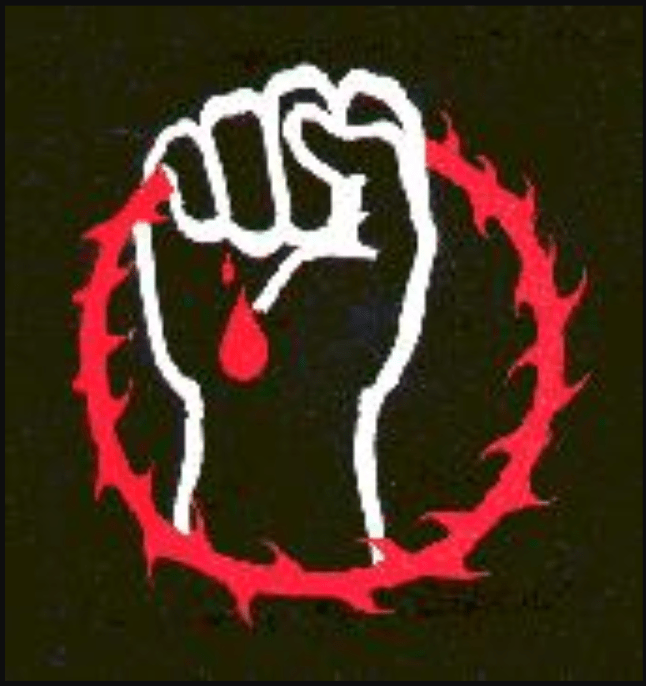
IC XC
✙
NI KA
THERE WAS VERY LITTLE POLITICAL CHOICE in my household growing up: one was either Democrat or one was silent. My stepfather was brave enough, once or twice a year, to pick fights on this issue. I don’t think he ever actually voted Republican, but I think it was something. to fight over, in those adult ways that make children terribly uncomfortable at the dinner table. When Mom was on the NY State Democratic Committee, my Aunt June was on the CA State Republican Committee. And so, friends on two sides of the family, with the Cuomos and the Reagans. Life was odd for us from the 70s into the 80s. When I got to college, Mom made me register to vote, an honor I accepted under protest, and when I got my absentee ballot that year at my Evangelical Christian College in the suburbs of Westchester County, I held open the double-wide newsprint and scandalized my dorm-mates by voting, in a bright red magic marker, across the board on the Socialist Labor line. I sealed it up, dropped it in the mail. Twelve years later my Mom called one November and said she was happy to see I had voted again: she always knew my across-the-board red vote. I confusedly asked her why she checked on her 30 year-old son, who had not, in fact, voted since he was 18 in that one election. But at least I know that someone in my home district was keeping up my traditional voting patterns.
The next time I registered to vote was when an actual leftist was running for Mayor in SF. I don’t mean a Democrat, although he – like anyone else in this town that wants to get elected – was registered in that party. I mean a leftist. He didn’t want real estate or tech money, bankers or the old guard to decide things in SF. He wanted, you know, electoral power and civic justice, better city taxes, health care, and education, high pay for teachers, lower pay for cops… naturally, he lost.
These stories are to indicate I have no partisan bona fides at all. Which is appropriate for someone who thinks of themself as an Anarchist, although not in the stereotyped, Molotov Cocktail sense of the word. I consider the state a real construct, and I consider the social contract to be real (and even for me to be beholden to it). But I do not consider myself to be bound to it. I am an ontological Anarchist: my person is mine. But before you get all grumpy about American Atomism, I give my person to the only King that is, Jesus Christ. That involves submission to his will, in his church. How can I be an anarchist then, you may ask: because no one coerced me into doing so. Not even I coerced me into doing so, for you can only submit out of a grace freely given to all: you cannot be drawn by force, it is the ontological nature of the human soul to seek truth and, having found it, to submit.
Much of our recent shared experience has been political theatre.
By political theatre, I mean something to distract us. Anarchist theory suggests that any protests are part of the state’s system for letting off steam in order that the system can keep going. Protests are like a valve on a pressure cooker. When the system changes bedroom names and says “small gatherings – except protests” this seems to be exactly the case. We are watching only the existing system of injustice give vent to the energies raised by shelter in place and fear of the covids. Businesses all over the political spectrum are making official actions to publicly adhere to the current political vogue. This is virtue signaling in the purest sense of the word: unless there is systemic change, which is beyond the power of any business, this will all be for naught. But we will all feel good. Then we’ll go back to being productive. Even tearing down statues is only a political drama: we feed into it by defending the statues and performing exorcisms (while carrying the American flag, no less).
Political theater reached unheard-of heights when the current incumbent departed 1600 Pennsylvania Avenue under cover of pepper spray and twice went to church. The predictable reaction was for members of the opposition party to waive their Bibles like flags, dress in cloth stoles like clergy, and be seen to pray. Both of these scenes triggered a new round of sectarian violence in the Catholic internet. This came to a head, recently, when the crypto-schismatic Archbishop Vigano came out of crypto, openly siding with President Trump against the canonical head of the Roman Catholic Archdiocese of Washington, Archbishop Wilton Gregory. Catholics, online and off, lined up in predictable sectarian fashion under these two princes of the Church.
Another part of the Catholic Drama has been our reaction to the protests and riots that are happening around the nation. Sadly this is parsing out in predictable, sectarian fashion as well. Not only Roman Catholics, but also the Orthodox, as well as various ecclesial communities and denominations, have all divided (as we did in the US Civil War) and simply mirrored our society. This division and political mirroring is kind of humorous when it comes to most issues. I don’t care how you feel about the Second Amendment, you can’t make me believe there is a theological reason for that feeling. But you can try so I can enjoy the political theater. Ditto taxes, single-payer health care, and the designated hitter rule.
Racism, however, is different. The Church should not mirror society on the issue of racism. It is not a political choice: there is right and there is wrong. St Paul (and the first council of the Church at Jerusalem) made it clear: there is no race in the Church, all are one in Christ. Racism (directed against previously-Gentile Jewish Christians) was the first thing that the Apostles were asked to deal with. They had to appoint men (Deacons) whose job it was to keep things rightly ordered. Still, we know that for a long time, on the topic of racism, the Church has simply mirrored society. We have bad actors in the Church and we also have the rest of us. As someone mentioned, the issue is not that there are “bad cops” but rather that the “good cops did nothing”. This is us in our current situation: it’s not that there are not bad actors – we all know there are. It’s that the rest of us do nothing. Pope Pius XII compared American Jim Crow laws to Nazi Eugenics and Pope Francis refers to how our “…toleration of evil, which is injustice, tends to expand its baneful influence and quietly to undermine any political and social system, no matter how solid it may appear. If every action has its consequences, an evil embedded in the structures of a society has a constant potential for disintegration and death. It is evil crystallized in unjust social structures, which cannot be the basis of hope for a better future.” But most of us seem quite happy with our crystals.
This is not a matter of data: you can’t count the number of “racisms” and say it’s going up or down. This is a matter of failed personal relationships. This is a matter of doctrine, a matter of right and wrong. I respond to you differently because of some element (skin color, usually) that I can see. I treat you as less than a person (usually by treating you as less then me). That is racism. It’s not a data point. It’s a failure of love. Christians know this: we know all sin is a failure of love, a failure in rightly-ordered relationships between human beings, each other, and God.
But, as the church works for salvation – not of some, but of all, we must realize that everyone out there needs Jesus. BLM needs Jesus. PBA needs Jesus. It’s not our job to support one to the damnation of the other. The Church, in order to be the Church, must bring Jesus to all. You cannot be silent: a choice has to be made, to stand with – and spread – God’s kingdom, or to be outside it. When someone who says “there’s nothing wrong” gets blocked by a Bishop on Twitter, with which side do you stand? There are sides there. Really. Don’t stand on the side that says “some don’t need Jesus.”
The air is full of plans, and of pacts and proposals. Every wind that blows through press and air carries patterns for new leagues, Federal Unions, Spheres of Influence, and Hemisphere Controls, each of which is spread out on the bargain counter of the world, and offered at a price so cheap as to require only a little manipulation of politics and economics-but never a change of heart. Are we not still suffering from a mental “hangover” from the days of liberalism and the doctrine of the natural goodness of men? Does not the enthusiastic and fulsome praise we give to every three-hundred-word generalization prove that all we think the world needs is a few structural changes?
Ven. Fulton Sheen, Seven Pillars of Peace
It is a mark of the failure of the American system that our political spectrum tends to run from center-right libertarian to further-right libertarian. At the farthest left end of our political spectrum are those who say it would be okay to tax others for social goods – usually the “wealthy”. But no one ever says, “Sure, tax me 40% more to pay for social goods.” For most of us, our idea of Justice involves correcting somebody else. Racism, however, asks us to deal with our own, personal acts of injustice. We want the government with political authority to correct other people but we also want that same government to leave us alone. As such, we are nearly all center-right Libertarians. Racism- and classism – however, is always in the first person. How to I show favoritism?
The protests offer us only more statism: they don’t like the system in place (rightfully so), yet they only want to give us a new system. What is that new system? Do they know? They reject the idea of “absolute truth” so what is their idea of “justice”? Is it merely revenge? That seems to be the case sometimes. Without a stated goal, a desired outcome, the protests will be hijacked (as they already are) by people with their own agendas and more skill at leading crowds. The protests, the yelling, the iconoclasm are not Justice coming into focus. They are only a distraction. From what? From the only hope any of us have.

Jesus wants to give us life. I do believe that Jesus fixes racism – but only by changing our hearts. The Church cannot mirror the world in this. The Church must not mirror the world or she is lost. Fa and AntiFa, everyone needs Jesus. If the Church picks a side, everyone loses. This is not political theatre: this is the souls of everyone we reach with the Gospel. Bl. Pier said that we need social reform: he was speaking of a reform that was possible at that time, in his country, when the vast majority of his fellow countrymen understood that to mean Christian Social Reform. He was not advocating merely more politics, but Christian politics. We must do the same. We cannot be partisans in this: we must be Christians. It is not enough to decide which side is right enough: we need to preach the truth.
There was a tradition of socialism in Anglo-Catholic circles in the late 19th and early 20th Centuries. An old website devoted to this subject still lives at the Internet Archive in all its early-internet glory: Anglo-Catholic Socialism. This quote, from Anglican Bishop Frank Weston, late of Zanzibar, ties it all together nicely in two ways:

The Church of England stopped saying no to these “ritualists” but they got them out of the way. They stopped them from making too much trouble. In England they were assigned to the poorest parishes: sent into the slums and villages too far from the railways, they were assigned to care for sailors in the dockyards or miners. As Bishops they were sent to the fringes of the Empire, to people who didn’t speak English, to places where no one important ever went. Blessedly that only made stronger their sense of social justice, as we would say now. Serving the poor, the marginalized, the weakest of society, they built up huge, strong communities with their Tridentine (in English) Mass, their Breviaries, and Religious Orders that looked “more Catholic than Rome”.
Our “ritualists” tend to drift right. I’m not sure why. There are very few open racists singing On Eagle’s Wings or holding hands at the Our Father. But the actual texts of the Extraordinary Form are as Revolutionary as the Novus Ordo. There is no reason a person praying the Latin Breviary should not walk out of Vespers wanting to
Deposuit potentes de sede, et exaltavit humiles.
Esurientes implevit bonis, et divites dimisit inanes.
Cast down the mighty from their thrones and lift up the meek and the lowly. Fill the hungry with good things and send away the rich in their stupidity.
Full stop.
Yet they wave flags on their censors, cast aspersions with their aspergillums, and dismiss “social justice warriors” as a bunch of silly “snowflakes” and – at the same time “terrorists who are persecuting us and destroying everything that’s good”.
Where’s the Catholic Left? For that matter, where is the Orthodox Left that would bring us the promise of the Paschal Homily?
Enter all of you, therefore, into the joy of our Lord, and, whether first or last, receive your reward. O rich and poor, one with another, dance for joy! O you ascetics and you negligent, celebrate the day! You that have fasted and you that have disregarded the fast, rejoice today! The table is rich-laden: feast royally, all of you! The calf is fatted: let no one go forth hungry! Let all partake of the feast of faith. Let all receive the riches of goodness. Let no one lament their poverty, for the universal kingdom has been revealed. Let no one mourn their transgressions, for pardon has dawned from the grave. Let no one fear death, for the Saviour’s death has set us free.
Attributed to St John Chrysostom
Is there no one who will say a Latin Mass and then turn and lead a march? Is there no one who sees the connection between the Sacred Heart and the sweat of the poor, between St Joseph the Workman and the union organizers at Starbucks? Do you not see the link between the Litany of Loreto and Laudato Si?

I have been listening to a number of political Catholic podcasts recently. I have been interested mostly in the discussion of Catholic socialism which is been taking place on Twitter and in several podcasts. These tend to fall farther to the left than many of my friends and social circle. (By way of listing the resources, see the end of this post.) What I’ve noticed is that there seems to be a marked lack of political theatre, although there are some abstractions. When the Gospel gets too far from the person-to-person relationship it drifts into political abstractions and heresy. But these folks seem to realize that it’s based on relationship.
I’ve also been intrigued by the overlap of the integralists and the socialists – although they rarely talk to each other, seemingly. I’m on the outside looking in. Both want a society built on Catholic principles, but the former are vague about the endgame, while the latter are not vague at all. Yet both seem to avoid a statist version of their history, seeking rather something that fits well with my ontological anarchy. God seeks your salvation… but it’s only in relationship. Submit to this yoke of your own free will, not through coercion. But it will be encompassing. Racism must be destroyed in our relationships. If we cannot relate as equals before God, no law will fix this. But charity is not enough and we need social reform. That can only come through changing society into the image of God’s Kingdom, the Church.
And this last can only come when the Church stops trying to mirror society and, instead, seeks to change it.
Links from this thread of posts & links on Integralism (The thread, by Fr Edmund Waldstein, O. Cist., maybe. there or not as the twitter comes & goes, but here are the articles.)
– 2014 Integralism
– 2015 The Good, the Highest Good, and the Common Good
– 2016 Integralism and Gelasian Dyarchy
– 2016 Integralism in Three Sentences
– 2017 An Integralist Manifesto
– 2018 Hans Urs von Balthasar’s Critique of Integralism
– 2018 What Is Integralism Today?
– 2019 Integralism and the Logic of the Cross

You must be logged in to post a comment.